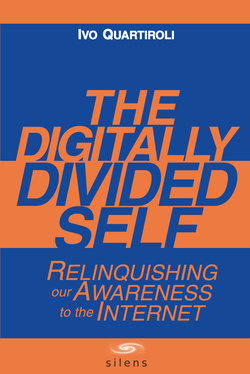Читать книгу The Digitally Divided Self: Relinquishing our Awareness to the Internet - Ivo Ph.D. Quartiroli - Страница 9
На сайте Литреса книга снята с продажи.
The Promises of the Early Internet
ОглавлениеAfter publishing my own books, I became a publisher of computer science books. Around 1994, when the Internet was becoming popular in Italy, I welcomed the Net in enthusiastic terms. Like many early enthusiasts, I saw the Net as a way to produce and share information in a more democratic way that could threaten big powers and even nation-states, and having the potential of shaping global consciousness.
Through Apogeo, my former publishing house, I published the first books in Italy about the Internet, convincing the traditional media that the Net wasn’t just about terrorists, pedophiles and dangerous hackers. For many years there was an opposition between the Internet on one side, and TV and print media on the other. Hostility toward the Internet was about competing interests, as well as simple ignorance. Their distorted, inaccurate and false vision of the Internet continues to this day.
At the same time, it was difficult to find a balanced, critical view of the role of the Net in society and in people’s minds. Anybody who criticized the Net risked being branded a close-minded conservative, a Luddite, an “old media” supporter wanting to limit the freedom of expression which the Net seemed to expand.
The fact is, though, that after twenty years of the Internet in our lives, most of the promises have not been fulfilled. We don’t have more democracy in the world, big media and big powers are even stronger, no global consciousness has arisen – and even though everybody can upload anything onto the Web simply and cheaply, we know less about what is happening in Iraq and Afghanistan than what we knew about the Vietnam war which was heavily broadcast. Yes, there are sites through which information can leak, but the leakage is a drop in the ocean of information daily available – and on sites read by a small percentage of web users.
Even when alternative information is presented, it is likely to be found on less popular websites that are far down in Google’s ranking. This merely deludes us into believing we have a tool for spreading information to the world – when in most cases it is more like a neighborly backyard chat. A chat, in fact, that can be traced and controlled. The big media have not disappeared – and their presence on the Net could make them even bigger.
Furthermore, privacy and control issues by governments and companies like Google and Facebook are, to say the least, worrying. What was once a place with no commercial interests is now full of advertisements, with some free services likely to become fee-based.
As soon as my company could afford it, I published a series on media studies, spirituality and Eastern culture, which reflected my personal life-path as a researcher of the truth. I switched from “updating” myself on the latest technical trends to attending workshops in different spiritual traditions and techniques. I went to ashrams in India and studied in psycho-spiritual schools in the US.
